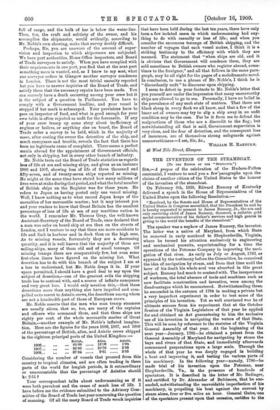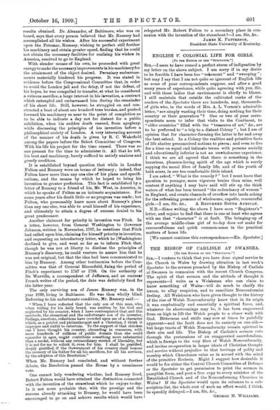THE INVENTION OF THE STEAMBOAT.
[To THE EDITOR OF THR " 8PECTATOR:9
SIR,ŌĆöA propos of the celebration of the Hudson-Fulton centennial, I venture to send you a few paragraphsupon the claims of another citizen of the United States to the honour
of the invention of the steamboat.
On February 9th, 1839, Edward Rumsey of Kentucky delivered a speech in the House of Representatives of the United States upon the following Resolution:ŌĆö
" Resolved, by the Senate and House of Representatives of the United States in Congress assembled, that the President be and ho is hereby requested to present to James Rumsey, Jr., the son and only surviving child of James Rumsey, deceased, a suitable gold medal commemorative of his father's services and high genius in giving to the world the benefits of the steamboat."
The speaker was a nephew of James Rumsey, the inventor. The latter was a native of Maryland, from which State he removed in early manhood to Shepherdsville, Virginia, where he turned his attention exclusively to engineering and mechanical pursuits, superintending for a time the operations of the Potomac Company in improving the navi- gation of that river. As early as July or August, 1783, as appeared by the testimony before the Committee, he conceived the idea of navigation by steam, and from that time until the hour of his death his whole soul was absorbed in this great subject. Rumsey had much to contend with. The inexperience of workmen, the total absence of tools and machines such as now facilitate construction and invention, were among the disadvantages which he encountered. Notwithstanding these,
he succeeded in the autumn of 1784 in making a private but a very imperfect experiment in order to test some of the principles of his invention. -Yet so well convinced was he of ultimate success from his experiment that at the October Session of the Virginia Legislature of that year he applied for and obtained an Act guaranteeing to him the exclusive
use of his invention in navigating the waters of that State. This will be seen by reference to the statutes of the Virginia General Assembly of that year. At the beginning of the next yearŌĆöJanuary, 1785ŌĆöhe obtained a patent from the General Assembly of Maryland for navigating by steam the bays and rivers of that State, and immediately afterwards commenced preparations upon a large scale. Through the whole of that year he was deeply engaged in building a boat and improving it and testing the various parts of his machinery. In the following yearŌĆönamely, 1786ŌĆöhe made trial of his invention upon the Potomac, near Shepherdsville, Va., in the presence of hundreds of spectators. It is described in the letter of Mr. Bedinger, and certified by Dr. Alexander of Baltimore, that be suc- ceeded, notwithstanding the unavoidable imperfection of his machinery, in propelling his boat against the current by
steam alone, four or five miles an hour. General Gates,-one of the spectators present upon that occasion, certifies to the
results obtained. Dr. Alexander, of Baltimore, who was on board, says that every person believed that Mr. Rumsey had accomplished all his wishes. After his sueoessful experiment upon the Potomac, Rumsey, wishing to perfect still further his machinery and obtain greater speed, finding that he could not obtain the necessary facilities for realising his wishes in America, resolved to go to England.
With slender means of his own, he proceeded with great energy to make the necessary improvements in his machinery for the attainment of the object desired. Pecuniary embarrass- ments materially hindered his progress. It was stated in evidence before the Congressional Committee that, in order to avoid the London jail and the delay, if not the defeat, of his hopes, he was compelled to transfer, at what he considered a. ruinous sacrifice, a large interest in his invention, a contract which entangled and embarrassed him during the remainder of his short life. Still, however, he struggled on and con- structed a boat of about one hundred tons burden, and pushed forward his machinery so near to the point of completion as to be able to indicate a day not far distant for a public exhibition, when his sudden death ensued, from apoplexy, while discussing the principles of his invention before a philosophical society of London. A very interesting account of the manner of his death is given by R. C. Wakefield among the papers before the Select Committee of Congress.
With his life his project for the time ceased. There was no one present for the time to administer it. All that he left, his boat and machinery, barely sufficed to satisfy anxious and greedy. creditors.
It is established beyond question that while in London Fulton and Rumsey were on terms of intimacy ; indeed, that Fulton knew more than any one else of his plans and specifi- cations, and the means by which he hoped to bring his invention to greater perfection. This fact is established by a letter of Rumsey to a friend of his, Mr. West, in America, in which he speaks of Fulton as an intimate acquaintance. For some years after his death little or no progress was made ; but Fulton, who presumably knew more about Rumsey's plans than any one else, was able to avail himself of his experience, and ultimately to attain a degree of success denied to his great predecessor.
Another claimant for priority in invention was Fitch. In a letter, however, from General Washington to Governor Johnson, written in November, 1787, he mentions that Fitch had called upon him, claiming for himself priority in invention, and requesting an introductory letter, which he (Washington) declined to give, and went so far as to inform Fitch that, though he was not at liberty to disclose the principles of Rumsey's discovery, he could venture to assure him that he was not original, but that the idea had been communicated to him by Rumsey. Among other testimonies before the Com- mittee was that of General Bloomfield, fixing the period of Fitch's experiment to 1787 or 1788. On the authority of De Warville, a correspondent of Jefferson, and an eminent French writer of the period, the date was definitely fixed for the latter year.
The only surviving son of James Rummy was, in the year 1839, living in Baltimore. He was then wholly blind. Referring to his unfortunate condition, Mr. Rumsey said :ŌĆö
" When I have reflected that the only son of this man, who, when toiling for his daily bread, was smitten by his God and neglected by his country, when I have contemplated that and this spectacle, the steamboat and the unfortunate son of its inventor, feelings, emotions, reflections have crowded upon me of a character which, as a patriot and philanthropist and a Christian, I think it improper and sinful to entertain. To the support of that stricken one I have thought his country, abounding in resources, with more hundreds of millions of public domain than she could squander in ages, might contribute something more substantial than a medal, without any extraordinary stretch of liberality, but it is not for me to solicit it, even for him. I shall be gratified, deeply gratified, if the Government of his country shall honour the memory of his father for all his sacrifices, for all his services, by the adoption of this Resolution."
When Mr. Rumsey had concluded, and without further debate, the Resolution passed the House by a unanimous vote.
One cannot help wondering whether, had Rumsey lived, Robert Fulton would have attained the distinction connected with the invention of the steamboat which he enjoys to-day. Is it not more probable that, with the prestige and the success already attaching to Rumsey, ho would have been encouraged to go on and achieve results which would have relegated Mr. Robert Fulton to a secondary place in con- nexion with the invention of the steamboat PŌĆöI am, Sir, &c.,
JAmEs K. 13
ŌĆö A.TTZEBON,
President State University of Kentucky.















































 Previous page
Previous page